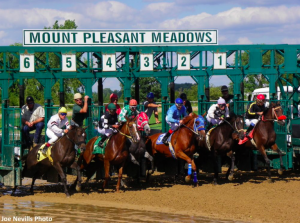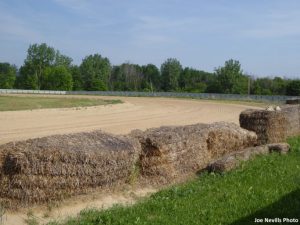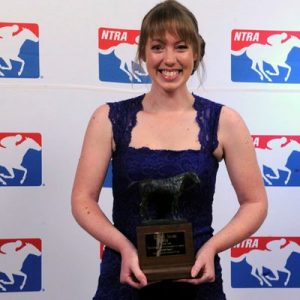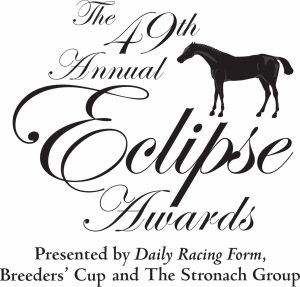By Mark Hansel
NKyTribune managing editor
Hallandale Beach, FL. – Joe Nevills of Georgetown, KY, was presented the Eclipse Award for Feature/Commentary Writing Thursday for his entry “Biting The Dust: A Long Goodbye to Mount Pleasant Meadows,” written for the Paulick Report on July 22.

Joe Nevills of Georgetown, KY, bloodstock editor for the Paulick Report, took home the 2019 Eclipse Award for Feature/Commentary writing for “Biting The Dust: A Long Goodbye to Mount Pleasant Meadows.” Photo credit: Penelope Miller/America’s Best Racing.
Nevills talked about getting the news that he had won the award and what it meant to him. He also explained why he felt compelled to tell the story of Mount Pleasant Meadows
“I got a call from Jim Gluckson with NTRA, Breeders’ Cup on the morning of Christmas Eve,” Nevills said. My wife actually won the Eclipse Award a few years ago, so we know that if Jim calls you at about this point in the year, you kind of know what it’s about.
Nevills, 33, is the bloodstock editor of the Paulick Report. He was previously a reporter for Daily Racing Form and the Thoroughbred Times.
Nevills’ wife, Natalie Voss, also writes for the Paulick Report and won her Eclipse Award in 2016.
Nevills said Gluckson ended the call with the same message he gave Voss.
“‘Don’t tell anyone outside of your immediate family and your boss until we get the release out,’ which wasn’t going to be until a day or so after Christmas,” Nevills said. “So, I’ve got several days to basically have all of this excitement and joy and to keep all of that bottled up.”
The Eclipse Awards are given to the Thoroughbred horses and individuals whose outstanding achievements have earned them the title of Champion in their respective divisions.
The awards were given out at Gulfstream Park in Hallandale Beach, Florida.
While many of the winners are not announced prior to the ceremony, winners of the media awards are notified in advance.
Nevills wrote an intensely personal story about the closing of Mount Pleasant Meadows, a track he has had a connection to since his youth.
Mount Pleasant Meadows was a half-mile oval that opened in 1985 in its namesake city, located about an hour north of Lansing.
While never a huge success (Nevills references a Detroit Free Press story that identified the track as “struggling” just three years after it opened), the track provided a place for Michigan horsemen to earn a living, albeit at the bottom rungs of the sport, for nearly three decades.

Joe Nevills of Georgetown, KY, took home the Eclipse Award for Feature Commentary Writing in a ceremony at Gulfstream Park Thursday night. Neville won for an intensely personal story about the closing of Mount Pleasant Meadows in Michigan and the impact it had on those who worked there. Photo courtesy of Joe Nevills and the Paulick report.
Mount Pleasant Meadows was dealt a serious blow by the introduction of casino gaming nearby.
The track property is located on the Saginaw Chippewa Indian Reservation and the tribe opened the Soaring Eagle Casino in 1998. There just weren’t enough dollars to go around and the race track felt an immediate impact.
Mount Pleasant Meadows continued to operate for another 16 years, but its fate was pretty much sealed and in 2014, it closed for good.
“Mount Pleasant Meadows was such an obscure track and when everything happened, I was kind of the lead person covering that and I’ve just got decades worth of knowledge,” Nevills said.
Nevills was living in Kentucky by this time, and it might have been easier, and less painful, to just let Mount Pleasant Meadows quietly become a memory.
He couldn’t.
Nevills felt that if he didn’t tell the story of the track, it would fade into obscurity without most ever knowing what it meant to so many people.
“If the track was going to get a proper sendoff, I was the one with the experience and the position to be able to tell that story and I needed to be sure that I did it correctly,” Nevills said. “Some of my favorite stories and songs are from people who have a grasp of a certain town, a certain region, a certain place. They know it so specifically that they are able to make it sort of universal.”
Not unlike Bruce Springsteen recounting memories of his early life in New Jersey, or John Mellencamp writing about the Midwest, Nevills poured his heart into the story.
“It took me the better part of five years to write it,” Nevills said. “The track closed in the early winter of 2014 and I kind of started floating the idea around. I figured, I’m only going to get one shot at this because the demand isn’t terribly high about a dead, tiny race track in the middle of nowhere, so I might as well take my time and get it right.”
For the next few years, he gathered some interviews and slowly, the story he wanted to tell came together.
“It was just a matter of sitting down, making sure I had everything in the place I needed to be and getting it to someone who wanted to run it, really,” Nevills said.
At about this time, in late 2018, Nevills was transitioning from his job at the Daily Racing Form to his position with the Paulick Report, and he was trying to bring the parts of the story together. All of the elements were there, but he didn’t know how to “drive home a finish.”
“I went up to what was left of the track, the grandstand is still there, the actual footprint of the dirt oval is still there,” Nevills said. “About this time, Michigan’s track in Detroit, Hazel Park also closed. So, all of a sudden, me and all the people I wrote about, basically, all of the people I knew in Michigan racing, were out of a job at the same time.”
The situation could not have been more dire for most of those involved, and Nevills was unemployed at the time as well, having not yet landed at the Paulick report.
From that unfortunate convergence of circumstances, or maybe because of them, the ending that tied the story together came to him.
The story, which can be viewed here, is long, even by online standards, but it brings to light so many of the challenges that horse racing’s smaller markets are facing.

Not much is left of Mount Pleasant Meadows race track in Michigan. Georgetown, KY, resident Joe Nevills was presented the Eclipse Award for Feature/Commentary writing Thursday night for his story about the decline of the track he frequented in his youth, and the impact the closing had on those who worked there. Photo courtesy of Joe Nevills and the Paulick report.
It also puts a very human face on the impact such a closure has on everyone from trainers and jockeys, to the more anonymous people who work tirelessly to keep the sport alive in those markets.
Chief among those in Nevills’ story is Scott Csernyik, who was a college senior when Mount Pleasant Meadows opened and he started working there. From that time, until the track closed, Csernyik had every job imaginable, including track announcer, bartender, assistant racing secretary and track photographer, just to name a few.
“The three people that I chose (Csernyik, jockey Lee Gates and trainer Nate Funnell) are really the people that I most associate with my memories of the race track,” Nevills said.” When I think of Mount Pleasant Meadows, I think of them.”
As Northern Kentucky horse racing fans know all too well, small race tracks fight an uphill battle almost every day.
River Downs in Cincinnati was in decline for years before casino gaming was approved in Ohio and it became the more successful Belterra Park.
Churchill Downs came to the rescue of Turfway Park in Florence late last year and plans major upgrades to that facility, which will be bolstered with the expected approval of sports wagering and the installation of historic racing machines.
Other small tracks, such as Mount Pleasant Meadows, Beulah Park in Grove City, Ohio and many others, have not been so fortunate.
People can bet on horses across the country and around the world all day long from a computer, so that may not seem a big deal to anyone beyond those not directly impacted by the closings but it could have broader implications.
Nevills said the reason it matters is that he has been hard-pressed to find people who become lifelong horse racing fans, that didn’t grow up with the live product in front of them.
“Mount Pleasant was 30 minutes from home and I could go there whenever I wanted to and get a local taste of the product and now that’s not there anymore,” Nevills said. “If you lose little tracks like this you are losing access to the live horse racing product and that’s a large group of potential horse racing fans that all of a sudden have to travel and that’s a hard ask.”
Nevills’ passion for the issue is obvious and spending five years bringing a story this complex together presented myriad challenges.
Nevills said thats where Voss’s support has been invaluable.
“We’ve got an interesting dynamic. We both work from home, for the Paulick report, so it’s been a shared success,” he said. “We fill different specialties within the industry, too. Natalie’s very good at investigative stories, she’s got that killer instinct and I typically handle the bloodstock end of things. She’s the writer I want to be when I grow up.”

Natalie Voss with the Eclpise Award she won in 2016 in the News/Enterprise category category. Voss’s husband, Joe Nevills, was presented the 2019 Eclipse Award in the Feature/Commentary Writing category Thursday (provided photo).
Voss admits that many couples would find the relationship they have an insurmountable challenge, but for them it is an asset.
“We’re as involved as you can possibly get with each other,” Voss said. “It works really well because neither of us are people who would have an easy time turning it off every day. So, it’s good that we can talk about whatever story we are working on and can bounce things off of each other.
Voss won the Eclipse Award for writing in the News/Enterprise category for “’Something’s Wrong With My Brain’ – The Lurking Danger of Concussions for Jockeys.”
“Unfortunately, I’m not sure how much has changed, since I wrote that story,” she said. “I think it’s improved a little bit in some places, but for the most part I think i’s the same as it was when I wrote that in 2016.”
The competition for an Eclipse Award is competitive in all categories, but unlike the awards for trainers, jockeys and horses, there are not statistics to help identify the most deserving accomplishments in writing.
“This was the story for him to win for, because he put so much into it,” Voss said. “I wasn’t surprised, because I knew it was good enough to win, but that doesn’t mean your going to get it.”
A complete list of Eclipse Award winners will be available in Saturday’s Northern Kentucky Tribune.
Contact Mark Hansel at mark.hansel@nkytrib.com

























